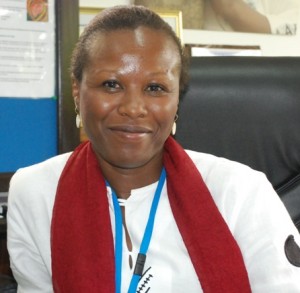Good nutrition, hygiene central to economic growth – UNICEF

The United Nations International Children Emergency Fund (UNICEF) has called on communities in the Volta region to observe good nutrition and sanitation practices as it holds huge potential to raise the country’s productivity economic growth.
The child rights body said the impact of good diet and cleanliness was so profound on lives that it ought to be observed often and embraced wholeheartedly among mothers, children and the working population to help improve concentration, alertness, problem-solving skills, and productivity.
Ms Susan Namondo Ngongi, the Country Representative of UNICEF, said this during a field visit to North Dayi District in the Volta Region to witness how UNICEF’s interventions have helped tame stunted growth in children and improved nutrition among mothers in local communities.
Health officials reported on Wednesday that the interventions launched by the UN organisation in 2013 have significantly reduced stunting and bettered nutrition habits among children and pregnant women in the savannah region.
“Nutrition is fundamental to development and how we nourish our children determine how strong we are; it improves children’s brains, the impact is important during young age,” Ms Ngongi said at a meeting in Jordanu, a local community in the District.
“The twin brother of nutrition is sanitation, and I am happy both good nutrition and sanitation practices are being observed here. The progress is very encouraging,” she added, after the District Nutrition Officer earlier told the gathering that all 65 communities in the District have been covered with nutrition and exclusive breastfeeding programmes.
Mr David Tekper, the District Nutrition Officer, told the Ghana News Agency that UNICEF provided funding and offered regular technical support to launch a series of locally tailored activities enabling them to reach out to hundreds of mothers, pregnant women and workers to educate them on good diet.
The direct involvement of traditional leaders including queen mothers, he said, made virtually every household understand why Vitamin A supplement be given to children and iodised salt use, as well as the need for pregnant women to visit and deliver at health facilities.
The District health officers have intensified routine growth monitoring and promotion of child welfare clinics or weighing, and helped to slash the prevalence rate to 2.8 percent, far below the World Health Organisation minimum standard of 10 percent, he said.
Administration of Vitamin A supplement to 6 to 59 months old children have also surged from 50.1 percent to 51.4 percent, while with the target reaching out to 1,806 pregnant women, 37.5 percent have been covered within a year, Mr Tekper said.
“The District target for children under two is 3,162 but we have so far covered 36 percent just in one year, the UNICEF came here in 2015, I came say that this is not done anywhere in the region not even in the whole country,” he added.
UNICEF is said to be the major source of funding for nutrition and stunting prevention activities in the region and has since 2013 support the health service GH₵ 550,931.84 since 2013.
Health officials attributed the programme intervention success to their cooperation with traditional authorities who support to ensure that households use iodine.
School authorities also help use the kids to dramatise the importance of exclusive breastfeeding for six months and continuous breastfeeding for two years plus formulae and good diet practice.
UNICEF launched its Water, Hygiene and Sanitation and Nutrition programmes in the region in 2013, which has since seen significant decline in stunted growth and improved nutrition in several communities.
Source: GNA
